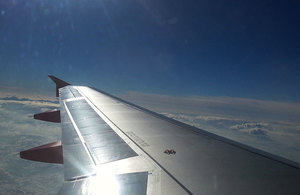Portugal, Hungary, French Polynesia and Réunion to be removed from travel corridors list
People arriving in England from these destinations from 4am Saturday 12 September 2020 will need to self-isolate for 2 weeks.

- Portugal (apart from the Azores and Madeira), Hungary, French Polynesia and Réunion removed from list of travel corridors for England following data showing a significant increase in confirmed cases
- Sweden added to list of travel corridors for England having been assessed by the Joint Biosecurity Centre as posing a lower infection risk
- travellers urged to check the latest advice from the FCDO before travelling and will be required to fill in a passenger locator form before returning home
People arriving in England from Portugal, Hungary, French Polynesia and Réunion from 4am Saturday 12 September 2020 will need to self-isolate for 2 weeks as these countries and territories are removed from the travel exemptions list.
Using the targeted islands policy announced this week, the government has been able to differentiate between Madeira and the Azores (which do not show a significant increase in cases), and the rest of Portugal. This means that passengers arriving in England from Madeira and the Azores will not need to self-isolate, but those arriving from Portugal and its other islands will need to self-isolate as it will be removed from the travel corridor exemption list.
The government has made consistently clear it will take decisive action if necessary to contain the virus, and data from the Joint Biosecurity Centre and Public Health England has indicated a significant change in both the level and pace of confirmed cases of coronavirus (COVID-19) in Portugal, Hungary, French Polynesia and Réunion.
Data shows that there has been a consistent increase in newly reported cases in Portugal over the past 3 weeks, with an 81% increase in newly reported cases over 7 days from 1464 to 2652 between 26 August and 9 September. Data from Hungary shows a 192% increase in newly reported cases over the past week, with the number of cases increasing from 1042 between 27 August and 2 September to 3047 between 3 and 9 September, indicating a sharp rise in COVID-19.
Data shows that there has been a consistent increase in newly reported cases in French Polynesia over the past 4 weeks, with a 77% increase in newly reported cases over 7 days from 78 to 138 between 19 August and 9 September. There has been a consistent increase in newly reported cases in Réunion over the past 4 weeks, with a 231% increase in newly reported cases over 7 days from 201 to 667 between 19 August and 9 September.
This has led to Ministers removing them from the travel exemptions list, meaning people will need to self-isolate when arriving from these countries to contain the spread of the virus and protect lives.
Sweden has been added to the government’s travel corridors list following a decrease in confirmed cases of coronavirus. From 4am on Saturday 12 September 2020, passengers arriving to England from Sweden will no longer need to self-isolate so long as they haven’t been in or transited through any other non-exempt countries, territories or regions in the 14 days preceding their arrival.
At the same time, the Foreign, Commonwealth and Development Office (FCDO) has also updated its travel advice to advise against all but essential travel to mainland Portugal, Hungary, French Polynesia and Réunion and is no longer advising against non essential travel to Sweden.
People currently in Portugal, Hungary, French Polynesia and Réunion are encouraged to follow the local rules and check the FCDO travel advice for further information. The government is urging employers to be understanding of those returning from these destinations who now will need to self-isolate.
COVID-19 has profoundly changed the nature of international travel. Travellers should always check the latest advice from the FCDO, given the potential for changing coronavirus infection rates to affect both the advice about travelling to other countries and rules about self-isolation on return.
Before travelling, people should find out about any entry restrictions, screening or quarantine requirements at their destination that might affect them. People should check travel advice and contact the UK-based embassy of the destination they are travelling to if they need more information.
All travellers, including those from exempt destinations, will still be required to show a completed passenger locator form on arrival into the UK unless they fall into a small group of exemptions. It is vital that all travellers returning to the UK complete a passenger locator form, to help us to protect public health and ensure those who need to are complying with self-isolation rules where they apply. Border Force carry out spot checks, and travellers who refuse to provide their contact details face a fine starting at £100.